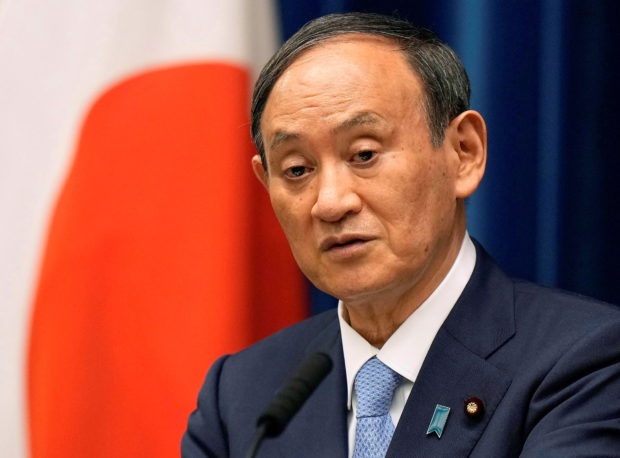
Japanese Prime Minister Yoshihide Suga speaks during a news conference announcing to extend a state of emergency on COVID-19 pandemic at prime minister’s official residence in Tokyo, Japan, August 17, 2021. REUTERS FILE PHOTO
TOKYO — Public support for Japanese Prime Minister Yoshihide Suga hit record lows, polls for two major newspapers showed on Monday, turning up the heat on the unpopular premier less than a month before he faces a challenge as leader of the ruling party.
Suga failed to capitalize on delivering the Olympics for the nation stricken by COVID-19, as a fresh wave of infections has forced the government to declare a fourth state of emergency in most of the country amid a sluggish vaccination rollout.
The Mainichi newspaper poll showed public support for Suga slid below 30% for the first time, to a dismal 26%. The Nikkei daily put his ratings at 34%, in line with a record low hit in its survey last month.
One of the polls also showed that Suga’s possible rivals for the top job, such as Administrative Reform Minister Taro Kono, who is leading Japan’s vaccination push, and former defense minister Shigeru Ishiba, were more popular with the public.
The 72-year-old prime minister also faced rare criticism from writer Haruki Murakami, who said that if the premier was able to see the way out of the pandemic, “he must have very good eyesight for his age.”
In a radio appearance on Sunday, the author of the 1987 novel, ‘Norwegian Wood’, said, “I’m the same age as Suga, and I don’t see a way out.
“That man has ears that don’t hear much, but his eyes are exceptionally strong. Or perhaps he just sees what he wants to see.”
The comments were among the most trending topics on Japanese Twitter. Chief Cabinet Secretary Katsunobu Kato did not comment on the statements at his regular morning news conference.
‘Difficult situation’
Despite the disappointing ratings, the party’s powerful Secretary General, Toshihiro Nikai, reiterated his support for the prime minister in a Monday interview with Kyodo news.
“In the current difficult situation, he’s working hard every day as the prime minister. It’s very good for the party if he continues to be in charge,” Kyodo cited Nikai as saying.
Speaking to reporters after a meeting with Suga, Nikai urged the government to deploy “bold” spending from its emergency budget reserves as part of an economic stimulus package, which he was tasked with crafting by the prime minister.
Kono and Ishiba, who have yet to declare if they will run in the Sept. 29 contest, were backed by 16% of respondents when asked by the Nikkei who would be the best as the new leader of Suga’s Liberal Democratic Party (LDP).
Suga, who has said he would fight to stay in his post, came in fourth at 11%, two points behind the low-key former foreign minister Fumio Kishida, 64, who declared his candidacy in a policy speech on Thursday.
The winner is virtually assured of being prime minister because of the LDP’s majority in parliament’s lower house.
Popularity ratings are being closely watched because the new chief must lead the party to a general election by Nov. 28, but which is expected earlier.
Unlike last year, grassroots LDP members will vote along with its members of parliament, which could make the outcome harder to predict. And novice MPs, fearful of losing their seats, may be wary of following their elders’ orders.
The LDP-led coalition is not expected to lose its majority in the powerful lower house, but forecasts suggest that Suga’s party could lose the majority it holds on its own, an outcome that would weaken whoever is leading the LDP.